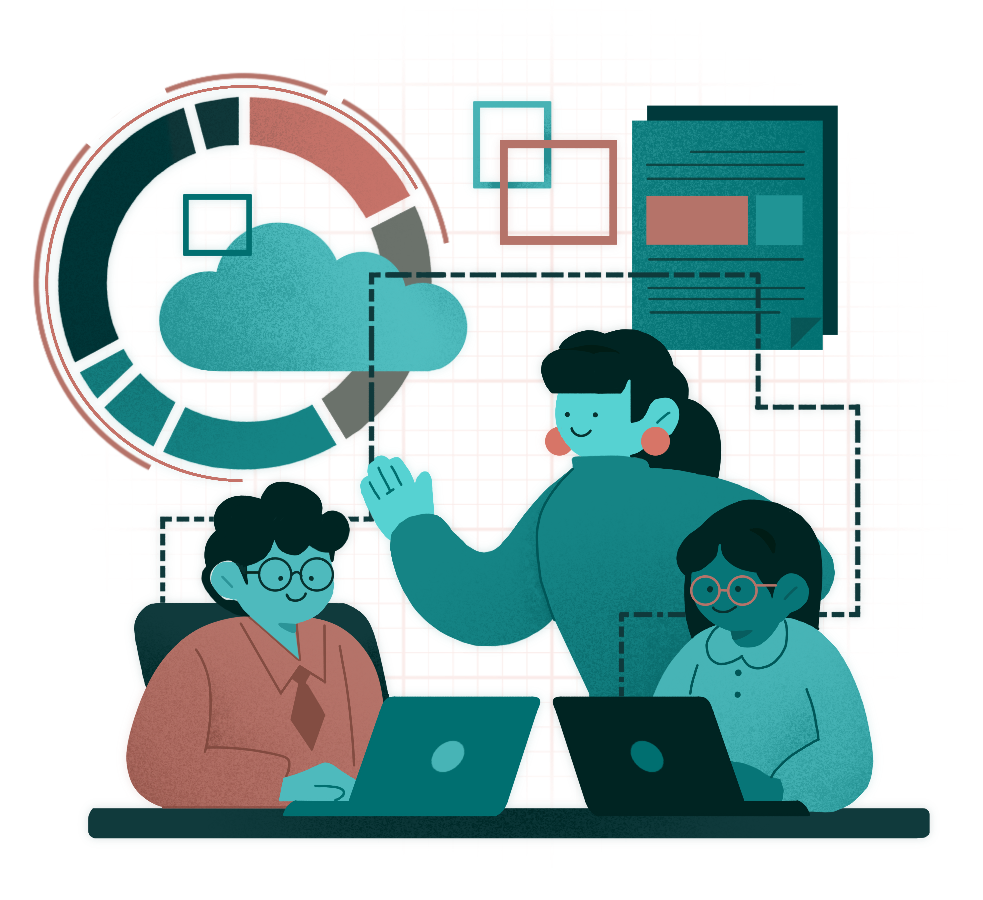Learning Objectives
- Identify key campus stakeholders who can benefit from and contribute to data literacy.
- Develop strategies to gain institutional buy-in for data literacy initiatives.
- Design events and activities that promote awareness and engagement with data across your campus.
Who Needs Data Literacy?

In a world where we are constantly surrounded by data, we all need data literacy! Everyone can benefit from better understanding how to interpret, question, and communicate with data. Regardless of what discipline you work in or what your future goals may be, data literacy is a skill set that will help you advance yourself [1].
For those working in a leadership capacity, such as an academic librarian, data literacy also enables better decision-making grounded in evidence. Academic departments can better identify gaps in their learning outcomes, advisors can tailor their support using student performance data, and administrators can allocate resources more effectively throughout their unit. Faculty, staff, and students can all bring unique perspectives to data literacy. Empowering them to use data confidently supports a stronger and more agile academic environment.
Getting Buy In From Stakeholders

When it comes to the academic environment, building a data culture requires thoughtful collaboration. Institutional change can only occur when it is championed by dedicated individuals from across departments, including faculty, IT, administrators, libraries, and students. Often it can help to begin with a small team of advocates who believe deeply in the value of data literacy and can advocate for its adoption. Then, allow these individuals to do the advocacy needed to construct that data culture.
Here are a few tips and tricks that might help your data literacy advocacy team gain buy-in from stakeholders around campus:
- Align data literacy with existing organizational goals: Connect your efforts to existing strategic priorities like student success and retention. Showing that growth in data literacy leads to greater retention is sure to get the administration’s attention! [2]
- Build interdisciplinary partnerships: An initiative being led by only one academic unit is likely to be less successful than one that engages multiple departments. Leverage existing relationships with departments around campus to build momentum towards achieving objectives.
- Speak to the level of the stakeholder: Not all stakeholders are going to be motivated in the same way or using the same language. While administration will be interested in retention, faculty might be interested in in-class performance and course readiness, and students may want to hear about employment outcomes.
- Provide flexibility for engagement: Allow stakeholders multiple means for engaging with data literacy content. Some options include workshops (discussed in the events section below), micro credentials (discussed in the case study), and one-on-one meetings.
Data Events and Activities
There are many different ways to engage stakeholders on your campus in data literacy activities. As noted in the prior section, the best practice is probably to offer many options for engagement, similar to how we might teach for different learning styles [3]. The following are just a few examples of events and activities that you might initiate on your campus:
- Host a “Data Literacy Week”: Having an entire week of activities can be a great way to increase awareness around campus. You could host panels with data experts, such as faculty around campus, hold hands-on workshops, and have students present posters on data literacy topics. "Love Data Week" is celebrated during the week of Valentine's Day each year and many universities celebrate with a week of activities, including the Big Ten Academic Alliance.
- Hold a Hackathon Event: Encourage students to work in teams to identify solutions to issues related to data literacy. The competitive nature of the hackathon will make it a memorable event. Several universities have hosted similar events in recent years, such as the University of Houston
- Lead a Data Storytelling Contest: Invite students to submit short narratives that discuss data visualizations that they have used to answer a question in their academic or professional life. A data storytelling contest at Iowa State University provides a useful example of what this type of event might look like.
Case Example

At the University of North Texas (UNT), we created an AI Fundamentals micro credential. The purpose of this micro credential is to educate the campus community about what AI is, the basics of how it works, and how it may be used ethically by faculty, staff, and students. The micro credential is offered free-of-charge for anyone with a UNT affiliation. The course is built within Canvas, the university’s learning management system, and includes a series of modules with videos, text, and links to external resources, as well as some quizzes and reflection activities. The micro credential was promoted online and across campus using promotional flyers.
In the first year of the micro credential’s availability, over 2000 students, faculty, and staff have completed the program and earned a digital badge. While AI understanding can only be considered one aspect of holistic data literacy, the program has served as a great way to start conversations about data-powered tools in higher education. This presentation recording discusses the process of building this micro credential program and how you might create a data literacy focused initiative for your own institution.
Reflection Activity
In a notebook or digital document, reflect on:
- Who are the key stakeholders on your campus who could help champion a data culture?
- What are some existing campus initiatives or goals that could be aligned with the proposed data literacy program?
- What types of data events or activities would resonate most with your campus community?
Summary
Fostering a data culture is not about turning everyone at your school into a data scientist. It is about equipping the campus community with the tools and confidence to ask better questions, make informed decisions, and communicate insights clearly. By engaging thoughtfully with stakeholders, aligning your initiative with current campus strategies, and adopting some creative programming and activities, you can build great momentum towards a more data-informed institution.
Additional Resources
References
- Hunter-Thomson, K. (2020). Interdisciplinary Ideas: Data Literacy 101: What can we Actually Claim from Our Data? Science Scope, 43(6), 20-26.
- Koltay, T. (2017). Data literacy for researchers and data librarians. Journal of Librarianship and Information Science, 49(1), 3-14.
- Maldonado, M., Mugglestone, K., & Roberson, A. J. (2021). Developing a Data-Informed Campus Culture: Opportunities and Guidance for Institutional Data Use. Institute for Higher Education Policy.
